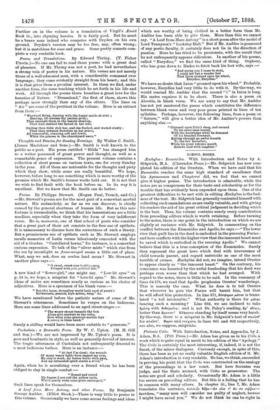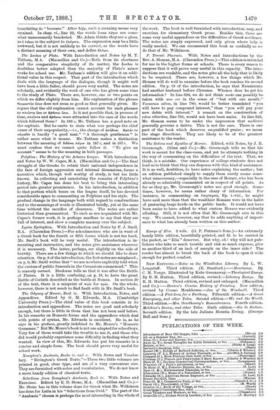Platonis Crito. With Introduction, Notes, and Appendix, by J. Adam,
B.A. (Pitt Press.)—Mr Adam has given, us in his Crito a work which is quite equal in merit to his edition of the "Apology." The Crito is certainly the most interesting, if, indeed, it is not the finest, of the minor dialogues. Curiously enough, in spite of this, there has been as yet no really valuable English edition of it. Mr. Adam's introduction is very readable. He has, we think, succeeded in proving his point that the Crito was constructed on the analogy of the proceedings in a law court. But here Socrates was judge, and the State accused, with Crito as prosecutor. The notes are good and scholarly. Occasionally Mr. Adam is a little too severe on preceding editors. But this is a failing that he has in common with many others. In chapter iii., line 7, Mr. Adam translates the sentence, woxxas arito,--(4 aos 6v re INCELV- IgLeXicrets, "many men will consider me guilty of neglect, because I might have saved you." We do not think he can be right in. translating clu "because." After 6ofw, such a meaning seems very strained. In chap. vi., line 22, the words i'vetta ?thou are some- what unnecessarily bracketed. Mr. Adam thinks they are a gloss, as 6 xbyos is the subject to Jal-r-ro. The expression may be a little awkward, but it is not unlikely to be correct, as the words have a distinct meaning of their own, and define taxon.







































 Previous page
Previous page